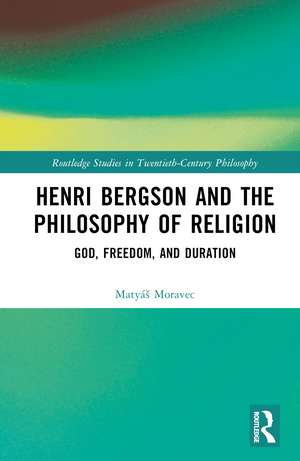Henri Bergson and the Philosophy of Religion: God, Freedom, and Duration: Routledge Studies in Twentieth-Century Philosophy
Autor Matyáš Moravecen Limba Engleză Hardback – 4 aug 2023
The question of how humans can be free if God knows everything has been a perennial issue of debate in analytic philosophy of religion. The solution to this problem relies heavily on what one thinks about time. The problem of time is central to Bergson’s philosophical system. In this book, the author offers a systematic application of Bergson’s thought to the freedom and foreknowledge problem. The first chapter presents a discussion of Bergson’s central concept of la durée (duration). The subsequent two chapters link la durée to the relation of time and space. Here the author provides a Bergsonian response to McTaggart’s argument for the unreality of time and develops a novel theory of time connected to Bergson’s analysis of temporal experience. The last three chapters explore the relation between free will, determinism, and divine foreknowledge. The author reconstructs Bergson’s theory of freedom and shows how it undermines the underlying dogmas of contemporary free-will theories. The author then argues that Bergson’s philosophy can be used to resolve the free will and foreknowledge problem in the philosophy of religion. The monograph concludes by opening avenues for new research into Bergson and analytic philosophy of religion, such as the philosophy of religious language, the relation between God and modality, religious experience, and religious pluralism.
Henri Bergson and the Philosophy of Religion will be of interest to scholars and advanced students working on Bergson, 20th-century continental philosophy, philosophy of religion, and philosophy of time.
Din seria Routledge Studies in Twentieth-Century Philosophy
- 9%
 Preț: 866.53 lei
Preț: 866.53 lei - 15%
 Preț: 396.61 lei
Preț: 396.61 lei -
 Preț: 381.40 lei
Preț: 381.40 lei - 9%
 Preț: 1038.26 lei
Preț: 1038.26 lei - 18%
 Preț: 1059.00 lei
Preț: 1059.00 lei - 18%
 Preț: 1003.99 lei
Preț: 1003.99 lei - 21%
 Preț: 269.60 lei
Preț: 269.60 lei - 18%
 Preț: 892.33 lei
Preț: 892.33 lei -
 Preț: 494.54 lei
Preț: 494.54 lei -
 Preț: 380.74 lei
Preț: 380.74 lei - 18%
 Preț: 1001.87 lei
Preț: 1001.87 lei -
 Preț: 387.27 lei
Preț: 387.27 lei -
 Preț: 487.37 lei
Preț: 487.37 lei -
 Preț: 388.13 lei
Preț: 388.13 lei - 18%
 Preț: 1117.43 lei
Preț: 1117.43 lei -
 Preț: 380.63 lei
Preț: 380.63 lei - 16%
 Preț: 334.55 lei
Preț: 334.55 lei - 31%
 Preț: 763.39 lei
Preț: 763.39 lei -
 Preț: 383.12 lei
Preț: 383.12 lei - 18%
 Preț: 1001.55 lei
Preț: 1001.55 lei -
 Preț: 380.25 lei
Preț: 380.25 lei - 18%
 Preț: 1001.87 lei
Preț: 1001.87 lei -
 Preț: 415.24 lei
Preț: 415.24 lei - 18%
 Preț: 1001.24 lei
Preț: 1001.24 lei -
 Preț: 481.58 lei
Preț: 481.58 lei -
 Preț: 388.90 lei
Preț: 388.90 lei -
 Preț: 483.49 lei
Preț: 483.49 lei -
 Preț: 389.38 lei
Preț: 389.38 lei - 16%
 Preț: 273.24 lei
Preț: 273.24 lei -
 Preț: 461.86 lei
Preț: 461.86 lei -
 Preț: 398.70 lei
Preț: 398.70 lei - 18%
 Preț: 1000.27 lei
Preț: 1000.27 lei - 13%
 Preț: 329.99 lei
Preț: 329.99 lei -
 Preț: 381.98 lei
Preț: 381.98 lei -
 Preț: 441.54 lei
Preț: 441.54 lei - 18%
 Preț: 1004.24 lei
Preț: 1004.24 lei - 18%
 Preț: 1059.84 lei
Preț: 1059.84 lei
Preț: 999.34 lei
Preț vechi: 1218.70 lei
-18% Nou
Puncte Express: 1499
Preț estimativ în valută:
191.25€ • 207.67$ • 160.65£
191.25€ • 207.67$ • 160.65£
Carte tipărită la comandă
Livrare economică 22 aprilie-06 mai
Preluare comenzi: 021 569.72.76
Specificații
ISBN-13: 9781032392530
ISBN-10: 1032392533
Pagini: 210
Dimensiuni: 152 x 229 x 13 mm
Greutate: 0.43 kg
Ediția:1
Editura: Taylor & Francis
Colecția Routledge
Seria Routledge Studies in Twentieth-Century Philosophy
Locul publicării:Oxford, United Kingdom
ISBN-10: 1032392533
Pagini: 210
Dimensiuni: 152 x 229 x 13 mm
Greutate: 0.43 kg
Ediția:1
Editura: Taylor & Francis
Colecția Routledge
Seria Routledge Studies in Twentieth-Century Philosophy
Locul publicării:Oxford, United Kingdom
Public țintă
Postgraduate and Undergraduate AdvancedCuprins
Introduction Part 1: Time and Consciousness 1. Bergson on Time and Space 2. Unreal Time or Real Duration? McTaggart and Bergson 3. Relative Existence: Towards a New Bergsonian Theory of Time Part 2: God, Time, and Freedom 4. Eternity and Bergsonian Time 5. Bergson and the Foreknowledge Problem 6. Bergsonian Freedom and Divine Causality Conclusion
Recenzii
“This is an ambitious and persuasive appropriation of Bergson’s thinking aiming to address one of the perennial problems of theism: the relation of divine foreknowledge to human freedom. Moravec’s ground-breaking and barrier-breaking book will be required reading for all those interested in the philosophy of religion.”
Mark Sinclair, Queen’s University Belfast
“This is a unique contribution to the field bringing together analytic and continental philosophical reflections on God, time, and free will. Moravec offers a fascinating and lucid reconstruction of Bergson’s thought, and creatively draws out the implications for contemporary debates within the philosophy of religion.”
R.T. Mullins, University of Lucerne
Mark Sinclair, Queen’s University Belfast
“This is a unique contribution to the field bringing together analytic and continental philosophical reflections on God, time, and free will. Moravec offers a fascinating and lucid reconstruction of Bergson’s thought, and creatively draws out the implications for contemporary debates within the philosophy of religion.”
R.T. Mullins, University of Lucerne
Notă biografică
Matyáš Moravec is Gifford Postdoctoral Fellow in Philosophy at the University of St Andrews, UK. His published work has appeared in the British Journal for the History of Philosophy, the International Journal for Philosophy of Religion, and The Bergsonian Mind (Routledge, 2022).
Descriere
This book connects the philosophy of Henri Bergson to contemporary debates in metaphysics and analytic philosophy of religion. More specifically, the book demonstrates how Bergson’s philosophy of time can respond to the problem of foreknowledge and free will.
